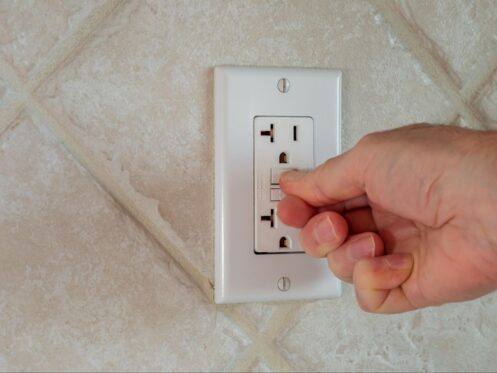Lights flickering in your home may seem like a harmless quirk until it starts happening more often or across multiple rooms. While it could be something as simple as a loose bulb, repeated flickering can signal deeper issues with your electrical wiring, circuit breaker, or even a faulty transformer. Ignoring it could risk damage to your electronics, cause a dangerous arc, or worse, trigger a fire hazard.
So, how do you know if it’s a quick DIY fix or time to call an electrician? We’ll help you determine your next step by covering common causes, safe troubleshooting tips, and signs that the flicker isn’t just annoying but an actual electrical emergency.
Common Reasons for Flickering Lights
If you’re frustrated by flickering lights, you’re not alone. Let’s break down the most common reasons:
- Loose Bulbs or Light Fixtures: The easiest fix? A bulb that’s not fully screwed in or a wobbly light fixture. When the connection isn’t secure, the current jumps and causes intermittent blinking. Try tightening the bulb or replacing it with a new one to see if the issue disappears.
- Incompatible or Failing Switches: Old, worn, or incompatible light switches can cause flickering, especially if you’ve upgraded to LED lighting. These mismatches interfere with how electricity flows, leading to that telltale flicker.
- Voltage Drop from Large Appliances: Ever noticed lights dim when the air conditioning or ceiling fan kicks on? That’s likely a voltage drop caused by power-hungry appliances pulling electricity from the same circuit. This is a common cause of house lights dimming, especially in older homes.
- Loose or Damaged Electrical Wiring: Loose wires, corroded terminals, or aging fuse panels can interrupt electrical flow, creating arcs and even fires. If lights flicker throughout the house, you may be dealing with a systemic issue that requires immediate electrical inspection.
- Service Drop Issues or Transformer Problems: When all house lights are flickering, the problem may lie beyond your walls at the transformer, utility pole, or ground connection. These can only be repaired by your utility provider or a licensed electrical contractor.
How to Troubleshoot Flickering Lights Safely
Before reaching for the phone or tools, take a few minutes to assess the situation. Is the flickering isolated to one room or one fixture, or is the whole house affected? If just one light is acting up, it could be a bad bulb or light switch. But if lights are flickering in your house across multiple rooms, you’re likely dealing with a bigger issue.
Turn off major appliances like your air conditioning, charging stations, or microwave, and watch your lights. If they stabilize, you might be overloading a circuit.
DIY Fixes for Flickering Lights
If your troubleshooting reveals a minor issue, you may be able to tackle it yourself. Start by turning off the power at your breaker box and checking the bulb for tightness. Try replacing it with a fresh, compatible option, especially if you’re using LEDs and haven’t updated your dimmer switch.
Anything more sophisticated should be left to a licensed electrician in Indianapolis. Especially if you open the panel and see burned wires, charring, or exposed copper, stop what you’re doing and contact us immediately.
When Flickering Indicates a Serious Electrical Issue
There’s flickering, and then there’s danger. If your house lights keep flickering even after replacing bulbs or switches, the problem might lie in your electrical wiring, service panel, or utility feed. This is particularly serious if you notice burning smells, warm outlets, or hear buzzing near light fixtures or outlets.
Other red flags include lights dimming every time an appliance turns on or lights flickering throughout the house at random. These symptoms may suggest a failing circuit breaker, a loose neutral wire, or degraded connections. Left unchecked, they could damage sensitive electronics, raise your energy bill, and pose real safety concerns.
Preventative Measures to Avoid Flickering Lights
To keep household lights flickering at bay, start with solid maintenance practices. Use surge protectors for all sensitive electronics, especially during storm season in Indiana. This prevents sudden voltage surges from frying your systems and keeps your lighting stable.
Also, schedule annual electrical inspections to spot small issues before they become dangerous. A licensed electrical contractor can test your voltage, inspect your grounding, and evaluate the condition of your fuse box, switches, and wiring. Prevention beats emergency repairs every time.
Fix Persistent Flickering with Hope Plumbing, Heating and Cooling
If you’ve tried the simple fixes and your lights still flicker, it’s time to bring in the pros. Hope Plumbing, Heating and Cooling offers comprehensive electrical repair services in Indianapolis to diagnose and solve everything from blinking light fixtures to high-stakes electrical faults. Give us a call today to get started.


